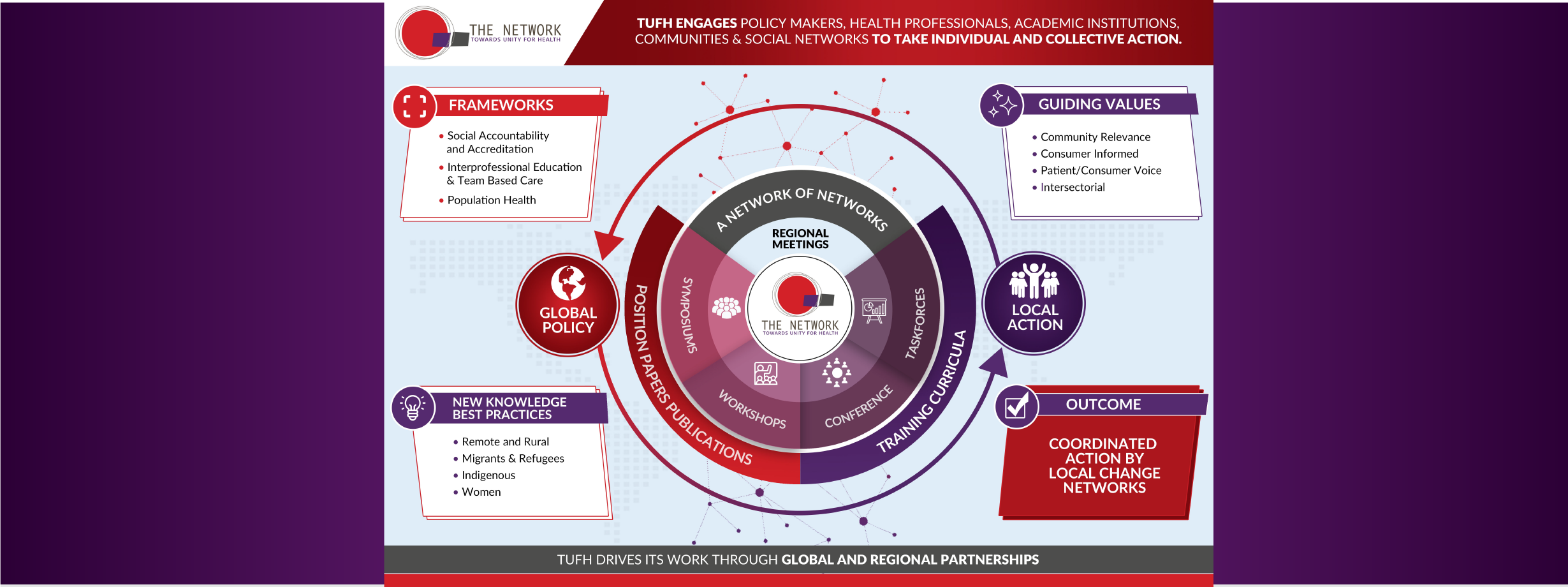Dear Reader,
This edition of the Social Innovations Journal was curated by The Network: Toward Unity for Health (TUFH), an official non state actor of the World Health Organization (WHO). TUFH is driven by a moral compact to mend the fabric of our communities upon which health depends. The Network: Toward Unity For Health is committed to drive communal interests by supporting local change agents work toward the adoption and implementation of global policy recommendations. TUFH concentrates its efforts on practical tools and solutions that can achieve action by local change networks.
TUFH does its work by bringing the "Partnership Pentagram" to life by supporting local change agents and Networks. TUFH’s "Partnership Pentagram" is framed within the sustainable development goals and social determinants of health emphasizing that creating a health system based upon people’s needs must not only involve the five key players in the change process, but must also do so within the context of where people live and work. TUFH engages policymakers, academic institutions, health professionals, and communities to collectively address the underlying barriers to healthy individuals and communities.
This edition highlights three policy action papers on social accountability and accreditation, interprofessional education and team-based care, and population health which were driven by TUFH’s policy fellows and guided by global thought leaders through TUFH’s Taskforces. Each policy action paper provides concrete policy recommendations and action steps for ministries of health, academic institutions, and health systems to adopt and implement. This edition also highlights best practices around the globe on the adoption and implementation of social accountability and accreditation, interprofessional education and team-based care, and population health.
Around the world, global health policy leaders and associations are convening global leaders, publishing research and policy articles, and releasing “call to action” initiatives for political leaders and health system institutions to adopt and implement. Many of these recommendations are framed within the United Nations Sustainable Development Goals, indirectly correlated with the social determinants of health, indicating that health is much broader than clinical interventions. Today, we witness hospitals and health systems being more like “repair shops,” trying to correct the damage of causes collectively denoted “social determinants of health.” The global fabric of our communities upon which health depends is torn and we must heal this fabric through communal interests.
We hope this edition is a first step toward healing the fabric of our communities.
Sincerely,
Nicholas Torres
Co-founder
Articles
Social Accountability and Accreditation
Titi Savitri Prihatiningsih, Yassein Kamal, Robert Woollard, Julian Fisher, Mohamed Elhassan Abdalla, Charles Boelen
Enhancing Social Accountability Skills in Medical Students Through Community School Projects
Mary Mathew
'Experiential Learning of Social Responsibility' -- A Case Study from D. A. Pandu Memorial R. V. Dental College, Bengaluru, India
Dr. S. Jyorsana
Linking Social Entrepreneur Education to Strengthen A Medical School’s Social Accountability Mission
Rachmad Bekti
Triggering the Art of Written Reflection in Medical Students
Dr. Anshu, Dr. Subodh S. Gupta
Interprofessional Education/Practice and Team-based Care
Samar Ahmed
Challenges and Strategies in the Construction of an Interprofessional Education Program: Collaborative Practice in the Context of Residency Programs
Luciana Branco da Motta, Celia Pereira Caldas, Liv Katyuska de Carvalho Sampaio de Souza, Neide Gomes Oliveira Miguel
Medical and Health Students Promoting IPE Using Innovative Approaches
Saad Uakkas
Development of Interprofessional Module in Dental Practice Management Education
Nanditha Sujir, Ciraj Ali Mohammed, Dilip G Naik, Ashita Uppoor, Animesh Jain
Establishment of the Centre for Dental Education, An Interprofessional Educational Initiative
Imran Pasha Mohammed
More than Bricks and Mortar: The Right to Healthy Housing
Brian Valdez, Dr Farah Shroff
Engaging and Giving: The Role of Health Professionals for Social Innovation and the Care of Vulnerable Communities
Alejandro Avelino Bonilla, Maria del Mar Moreno Gomez
Multi-Sectoral Mapping for Nutrition (MS4N) in Sindh, Pakistan
Zahra Ladhani
Exceptional primary care for exceptional times in Chile
Philippa Moore, Klaus Puschel, Paulina Roajs, Paulina Pinto, Alvaro Tellez, Victoria Cuadra
Australian Aboriginal Community Response to the COVID-19 Pandemic
Rosalie Schultz
Addressing Students' Uncertainty During COVID-19 from the Social Accountability Standpoint, A Case Study of Menoufia Medical School
Nagwa N. hegazy, Rania M. Azmy, Naser A. Agizy
COVID19 Prevalence and Antibody Seroprevalence Among Individuals with Intellectual Disability
Scott Spreat; Tiffany Adams, Darlene Barnes, Jennifer Caputo, Dawn Diamond, Tine, Deborah Jones, Stephen Kolesk
Issue 62 | Social Accountability and Accreditation; Interprofessional Education and Team Based Care; and Population Health Approaches to Global Health Access and Equitable Health
Typography
- Font Size
- Default
- Reading Mode



